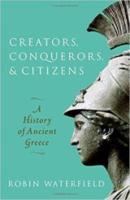
OUP (2018) h/b 544pp £25.00 (ISBN 9780198727880)
The peoples whom today we casually call ‘Ancient Greeks’ were, in fact, a diverse group: in the Archaic and Classical Ages (roughly 750—323 BC) some did live in the land we now call Greece, but many more lived in poleis (city-states) around the Mediterranean (not least in South Italy and Sicily) and east to the Black Sea, while even before the Hellenistic Age (323—30 BC) some ‘had come to be called Greek more because of their absorption of Athenian culture than because of their birth’. Moreover, while (according to Herodotus’ well-known maxim) ‘we Greeks are one in blood and one in language: we have temples to the gods and religious rites in common, and a common way of life’, relations between these glory-seeking Hellenes (it was the Romans who first called them ‘Greeks’) were rarely peaceful. For much of their history, voluntary common endeavours were rare and short-lived. As Plato observed: ‘Every polis is inevitably engaged in undeclared warfare with every other polis.’
With this in mind, following introductory chapters on Greece’s environmental and historical background, W. sets out to trace seven and a half centuries of Greek history (from roughly the first Olympiad to Rome’s annexation of Egypt), recognizing the diversity of the Greek diaspora, while explicating many of the social and cultural practices that lent it a degree of unity, and tracing innovations in areas as diverse as philosophy and siege warfare. It is a mark of his skill that he succeeds so brilliantly. This is in part down to his arrangement of the material. Divided into three ‘Acts’ (corresponding to the Archaic, Classical and Hellenistic periods), W. explores his subject both linearly and laterally, interspersing chapters of narrative history with others covering themes such as religion, warfare, economy and family life, while taking time to explore a range of individual poleis (Athens, Sparta and Syracuse) as well as life in Hellenistic cities.
Inevitably in such a wide-ranging book, there is little room for in-depth analysis, but the fast pace of the historical narrative does have the undoubted benefit of bestowing rare clarity on periods and events that can at times seem bafflingly complex (though Alexander’s successors’ jockeying for power will always be a minefield). Inevitably, too, there will be some details with which individual readers might disagree (for example, while W. suggests that in Persians the Athenians ‘are clearly meant to stand for the Greeks as a whole’, others might argue that, in fact, Aeschylus deliberately appropriates the allied victory to Athens for political purposes). But such quibbles pale into insignificance in the face of W.’s indisputable achievement.
Drawing on contemporary literature and inscriptions, informed by the most up-to-date archaeology, illustrated throughout with half-tone photographs and containing an excellent timeline (from 1200 to 27 BC), lists of rulers (of Ptolemaic Egypt, Macedon from the fourth century, Pergamum, Persia, Syracuse and Seleucid Syria), fifteen maps and a glossary, this book provides an invaluable resource for anyone wishing a comprehensive account of Greek history and culture, while reading lists point the way for those who wish to find out more. W.’s masterly review of how tensions between cultural unity and political disunity unfolded over eight hundred years is to be thoroughly recommended.
David Stuttard
